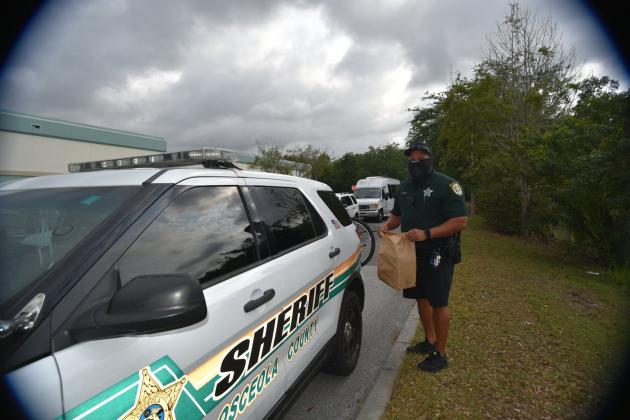Even before COVID-19 closed area businesses and put thousands of Osceola County residents out of work, local nonprofits struggled to meet the needs of the working poor here.
Now, the demand is unprecedented and funds are still tight. Still, the spirit of giving remains alive in Osceola.
Representatives from local nonprofits meet three times a week via teleconference with officials from Osceola County’s Emergency Operations Center and its Human Services department to gauge the ever-growing demand for services and to share ideas about how to provide them.
The county and the cities of Kissimmee and St. Cloud are also providing assistance to local nonprofits to help the public.
St. Cloud, for example, gave the St. Cloud Community Pantry $15,000 last week.
“What’s going on is so emblematic of Osceola County because we’re traditionally under-sourced, and there’s so much need in our community. So, like we’ve always done, we’re working together to do the best we can to take care of people,” said Sue Ring, associate director of Community Vision, an umbrella organization that brings together the area’s public, private and faith sectors.
“The challenge for the nonprofit community is trying to keep their employees and their clients safe. But then not only are they serving their normal clients, they’re also serving new folks who haven’t been in the social services system before and are now turning to the nonprofits,” Ring said.
Such is the case at the Community Hope Center of Osceola.
“We’re experiencing a lot of changes in how we deliver services during this time of the pandemic,” said CEO Rev. Mary Downey.
The center’s advocates are all working remotely, connecting with clients by phone or online, she said.
“As we got more information about social distancing, we didn’t want the Hope Center to be a place where people were constantly congregating,” Downey said.
The center first transitioned its hours of operation to three days a week in early March. But after Osceola’s stay-at-home order was put into place on March 26, it transitioned to one day a week and is now open only on Wednesday’s from 10 am to 1 pm.
The Hope Center’s food pantry had only been open to active clients, but is now open to the public.
From March 16 through April 12, the center was open only eight days but served 2,531 people. It typically serves about 600 people per month. More than 70 percent of those coming for help have reported losing their jobs because of the health crisis, Downey said.
During the three hours the center was open April 16, 185 households were supplied with food.
More than 70 percent of those coming into the Hope Center have reported losing their jobs because of the health crisis.
Unemployment benefits have been extended 13 weeks for a total of 39 weeks, but with the state backlog mean many have applied for help but few have received it.
Many people are calling the center for help paying their mortgage, their rent or their hotel bills.
Even though Gov. Ron DeSantis suspended evictions until late May, “people are scared they’re going to be evicted,” Downey said. “There’s a real fear there.”
Hotels and motels are largely excluded from the governor’s eviction protection, order she said.
Thousands in Osceola County live in hotels and motels. Many of them were only one paycheck away from the streets even before the crisis started.
“That’s been one of the things we’ve been working through,” Downey said. “Trying to figure out how we can help families who are not able to pay their bills and encouraging them to increase their benefits in other places.”
“When it comes to evictions, we want people to be reminded that even though evictions are stalled right now, we still have to make sure we encourage people to pay as much as they can because there will be an end to this,” she said.
“Our community is not prepared to make payments for people who get thousands of dollars behind,” Downey said. If you can pay anything toward those rent and utilities we encourage you to do that.”
And instead of accepting donations directly from supporters, the Hope Center is asking them to use the AmazonSmile website to buy goods that are then shipped to the agency.
The most-needed items are diapers, deodorant, toothpaste and other hygiene items, she said. Because there is such a demand for diapers, people can deliver them directly to the center.
Meanwhile, at the Council on Aging, the Meals on Wheels and food assistance programs are also flush with new clients.
More than 1,000 families have been receiving roughly a 10-day supply of food through the council, said Meals on Wheels director Wilda Belisle.
“Between 70 and 100 people are calling everyday for help with food,” she said.
Before the crisis, 274 seniors were receiving Meals on Wheels everyday. It’s now 500.
About 100 of them transitioned from the congregate meal program at the council and its satellite sites, but the rest are new clients.
“It’s so heartbreaking,” she said. “You have these seniors being told by their doctors that they can’t go out. They’re really worried. They’re desperate. You hear the fear in their voices,” she said.
What’s more, the council has seen a 50 percent drop in volunteers for the Meals on Wheels program, from 160 down to 80.
“Thank God the Sheriff’s Department came to the rescue when they heard we were struggling. Now we have 10 officers coming here everyday taking those hard-to-fill routes,” she said.
Along with the spike in demand, there has also been an increase in food donations, she said.
The council is participating in a local initiative to connect local farmers with agencies providing food. And the Goya company is set to deliver a truck full of frozen foods this week, she said.
“It’s not always the same stuff coming in. So whatever we get that makes a good meal, we put it together and give it out,” Belisle said. “People are getting really desperate. It’s getting worse and it’s not going to be over soon,” she said.
No one has been turned away so far, she said.
“We’re doing what needs to be done and worrying about everything else later.”




